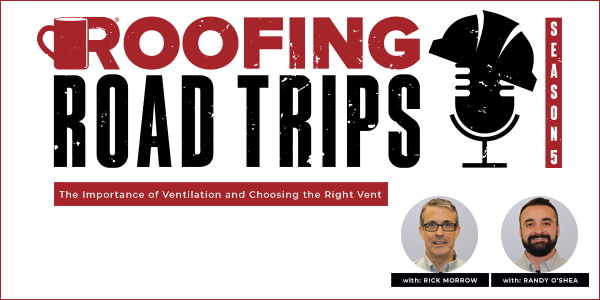Reed Hitchcock and Aaron Phillips - The State of Asphalt Roofing - PODCAST TRANSCRIPTION

Editor's note: The following is the transcript of a live interview with Reed Hitchcock and Aaron Phillips of ARMA. You can read the interview below or listen to the podcast.
Speaker 1:
Welcome to Roofing Road Trips with Heidi. Explore the roofing industry through the eyes of a long-term professional within the trade. Listen for insights, interviews, and exciting news in the roofing industry today.
Heidi Ellsworth:
Hello and welcome to another Roofing Road Trips from RoofersCoffeeShop. This is Heidi Ellsworth and I am here today with leaders in our Industry, so much knowledge. I am so excited to have Arron Phillips and Reed Hitchcock with ARMA, the Asphalt Roofing Manufacturing Association here with us today. Welcome, gentlemen.
Reed Hitchcock:
Thank you. It's a pleasure to be with you.
Aaron Phillips:
Thanks, Heidi.
Heidi Ellsworth:
I'm really excited you have so much going on and I mean, talk about thought leadership. You're constantly coming out with reports, with instructions, with surveys, so many great things. We're going to talk about all of that, including new manuals today. But before we get started, I would love to have you both introduce yourself. So Aaron, why don't we start with you? If you could introduce yourself, tell us a little bit about your history, and about ARMA.
Aaron Phillips:
Sure. Absolutely. Aaron Phillips, as Heidi said, I'm ARMA's Vice President of Technical Services. I've been in the industry a long time. Spent the first little more than 34 years in my career with a single company, one of our member companies, TAMKO Building Products. And then in the midst of COVID in November of 2020, I made a choice to try something new, a new challenge, and I moved to ARMA. And just passed my two-year anniversary with ARMA. And so still learning some things about the association, but glad to be aboard and glad to be working with the industry.
Heidi Ellsworth:
Congratulations. But I mean, two great companies, TAMKO and now with the ARMA organization. That's great. Reed, please introduce yourself, for those who may not know you.
Reed Hitchcock:
Thanks, Heidi. Reed Hitchcock. I'm ARMA's Executive Vice President. I've been with the organization since, golly, 2003, so creeping up on my 20-year anniversary with the organization and in this role since 2007. And I just want to add on Aaron's, he also was a volunteer chair for the association for a long, long time in a position that used to be a little, like, we would joke, it was Hotel California. You could check out anytime you wanted but you could never leave. And so I just have to say I'm thrilled to have Aaron on our team and it's been a great addition to our group on the association's side.
Heidi Ellsworth:
That's great. That's great. Well, speaking of the association, Reed, I'd love for you to just talk a little bit about ARMA, it's history, and it's mission. If you could share that with everyone listening.
Reed Hitchcock:
Sure. So ARMA has been around in one form or another, since 1915. We started off as the Asphalt Roofing Industry Bureau back when there were a whole lot more manufacturers than there are now. In the 1970s, the name was changed and the organization more formalized under the Asphalt Roofing Manufacturer's Association. And certainly throughout the '70s, '80s, into the '90s, and even more recently, through a lot of consolidation, the number of manufacturers of asphalt roofing has gotten smaller. Although we're very proud that we still maintain a big part of the roofing market, both residential and commercial.
As an organization, our mission, like so many of the trade associations, is really to engage on behalf of the industry where we can, where appropriate, within the guidelines of some pretty strict antitrust rules to advance the industry. And that's really in the areas of advocacy, promotion, communications, and really thought leadership in the industry. And that's really what we strive to be and to accomplish. At the end of the day, our job is to make sure that there's a competitive playing field in the roofing industry, and our manufacturers have the ability to produce and sell their materials.
Heidi Ellsworth:
Yeah. And about promoting the industry, you do such a fabulous job. I mean, one of the, really, I think, cool things that you do every year is your awards program. And I am honored to be a judge.
Reed Hitchcock:
Yes.
Heidi Ellsworth:
And yeah. I love seeing all the projects. And my career started out, as you may know or may not, with Malarkey Roofing Company. So, I love to see these asphalt shingle roofs and projects and all the different things that are going on out there. But Reed, maybe you can tell us just a little bit about that awards program. I know it's launched and people are sending in all these great projects.
Reed Hitchcock:
Oh, yeah.
Heidi Ellsworth:
How does it work?
Reed Hitchcock:
Well, it's as easy as clicking through to our website and filling out a form. We're real excited. Over the last few years, we've really grown this program. We've enhanced and really revamped it in a lot of ways. One of the things I want to make sure everybody knows is that it's not just shingles, it's commercial asphalt roofing as well. And that also, it's important that folks know it's not just about how pretty it is. I mean, asphalt roofs are beautiful, as we all know.
Heidi Ellsworth:
Yes.
Reed Hitchcock:
But it's also about some of the technical complexities and challenges that contractors face, when putting on a roof on a dynamic structure that may have really unique needs.
Heidi Ellsworth:
I'm always so impressed. And I have to agree with you on the commercial, the low slope roofing, when you see the technical, I mean, there's technical, whether it's steep or low, but when you see that technical craftsmanship that goes into these roofs, it's just so impressive. And I also am partial to the bright white too. Seeing that and how that's changed the industry recently, has been really, really fun to watch. And talking about that and talking about technical and really the professionalism and the craftsmanship, Aaron, you have just been a big part of the 2022 edition of the Residential Asphalt Roofing Manual - Design and Application Methods. And [inaudible 00:06:30] has been released. Can you tell us about that?
Aaron Phillips:
Absolutely. This is one of ARMA's premier publications. We revise this and update it every so many years. The prior edition to this one was released in 2014, so it's been eight years since we went through the manual and provided an update. And every time we do that review, we put together a group of experts in the industry, and literally pour through every page of the manual, look at every figure, consider all the different aspects. And in many cases, there are a lot of just very subtle, minor changes intended to improve readability, improve communication, those types of things.
But then we're also looking for, are there significant issues that have changed in the industry that we need to add or bring attention to? And a couple of those in this particular edition of the manual, relate to underlayment. One of the changes we made was in our chapter three, which is on design considerations, by adding a specific section on underlayment. And that's really to bring attention to the importance of underlayment as an element of an asphalt shingle roofing system.
And then also related to underlayment, I think anyone involved in the steep slope side of the business is aware of the growing popularity of this technique called, sealed roof decks, where they're either putting an adhesive tape over the joints between the sheathing. Or in some cases they're covering the entire roof deck with a self-adhering membrane. And so we've added a brand-new section about that, just alerting readers of the manual that that is a practice that's becoming more prominent, especially in areas subject to extreme wind events. That's really what it's there for, is kind of as a second area of protection. If the primary roof covering in an extreme event gets affected, allows water to get underneath the shingles, then you've got that second layer of protection that protects the building. And that really helps the homeowner get back into the building sooner after an event, reduces the amount of damage to get that building back up and operational. And so that's a new section also that we've added to the manual, this go around.
And there is, I think, some breaking news that you might be interested in. And that is our plans to release a digital copy of the manual that will roll out, I think in early 2023. We recognize there's just more and more people that are wanting to access these materials digitally. The hard copy, there's still a lot of demand for it as well. But that digital copy will be another way to get the word out.
Heidi Ellsworth:
Oh, I'm so glad to hear that. I mean obviously, being RoofersCoffeeShop and fully Digital, we see that need growing every single day. So, that's going to be hugely popular out there to have. But you know what, it's also nice to still have the book, so-
Reed Hitchcock:
You can't beat writing your notes in a book out in the field.
Heidi Ellsworth:
Yeah.
Reed Hitchcock:
But there is definitely more and more demand, especially as contractors are walking around with iPads now and what have you. And so, we got to get it out. And so, that'll be out in the first-
Heidi Ellsworth:
They can pull it right up. Yeah.
Reed Hitchcock:
Yeah.
Heidi Ellsworth:
Yeah that is-
Reed Hitchcock:
First quarter.
Heidi Ellsworth:
Yeah, that's great. First quarter. Well, we'll definitely have that release on RoofersCoffeeShop, so everybody stay tuned so you get that when it comes out. That is great. And you guys are doing so many new things like that. And one of the ones I've been really excited to be a part of and to be watching is [inaudible 00:10:03] pro certification with NRCA. And the asphalt shingles you're working with them on... and that's already out the pro certification for asphalt shingles. Reed, how's that going?
Reed Hitchcock:
Good. I periodically check in with the NRCA team, and I know that, I mean it's a long road because it's a big time demand for contractors to go through that certification process. We were real happy to have shingles included early on. And I mean, listen, anything that acknowledges and reinforces the importance of good installation, it's a program that we like. And a lot of our members work one-on-one with NRCA in terms of specific promotion of it. But by and large, I think we're starting to see more and more acceptance and use of it throughout the industry, contractors as well as manufacturers promoting it through their own devices, if you will. And the other thing related to that is that right now, we're working with NRCA on a low slope asphaltic-
Heidi Ellsworth:
Excellent.
Reed Hitchcock:
... systems pro certification. And so we're itching to get that one out into the field as well. So, stay tuned. I know that it's coming quickly.
Heidi Ellsworth:
There seems to be a lot of early adoption, more on the commercial side for NRCA that they're seeing. But I think this is not a sprint. This is a marathon of raising the professionalism of the industry. And down the road, I can see definitely, I mean, obviously there's a lot of asphalt shingles that go on commercial properties. But there's also in time, I really believe that this will become an expectation of homeowners also, to know that they have certified installers or at least one on the job, and that they understand how to make the sustainability of the roofs.
Reed Hitchcock:
Absolutely. And I think for me, if I was a commercial or a residential roofing contractor, I'd want to leverage that as a competitive advantage.
Heidi Ellsworth:
Yeah, exactly. That's what we're hearing too, a lot around marketing. But it's a shift. It's a shift in the industry. And Aaron, you've seen this. I mean, throughout the years, there's been such a shift in just in the last 10 years, what I've seen on how contractors, especially if we're going to be talking about residential and asphalt roofing, asphalt shingles, there's been a lot of changes on how contractors are going to market.
Aaron Phillips:
Yeah, absolutely. And I think this credentialing pathway is a wonderful idea that NRCA's come out with. Because it really does provide a job path for people that are interested and are motivated to be in that industry, that like to work in that environment, and like to be outside. It gives them a path for advancement and to continually improve.
Heidi Ellsworth:
Yeah. Yeah, that's it. I was just at the NRCA fall meetings last week, and it's the top topic, I've been telling you. It's what's happening out there. But also, there is so much going on with technical research papers, everything. And so Aaron, I would love to, in your role of two years now with ARMA, what are some of the technical papers? What are some of the research that you've been really focused on over the last couple years, that contractors that can really help their business?
Aaron Phillips:
Well, ARMA offers an awful lot of material. And I'll just highlight on our website, we have this entire series of technical bulletins, which are one or two-page documents. They're topics specific, they're available at no charge to any interested party that wants to go out there. These go through regular maintenance. We have a cycle that we run these through and update them periodically. And so, it's a continuous maintenance process for this collection of bulletins.
And earlier this year, we released an update on our asphalt shingle recycling bulletin. I think that's an important topic that we're talking about more and more. We also released our bulletin on cold weather recommendations for built-up roofing. We're coming into the colder part of the year, and you need to pay attention to certain things when you're doing installation at colder temperatures.
We've got another series of bulletins in the queue that'll come out here in the next few weeks, probably into the first quarter of next year. Plain facts about buckled shingles, there's a really good one, I think that's helpful to both building owners as well as installers, on asphalt shingle re-roofing. How do you make a decision whether to tear off down to the deck or whether to put a new roof covering over an existing one? That's a helpful one. And we've got a couple coming out on the topic of ventilation as well.
In the works, we talked earlier about our asphalt roofing manual, asphalt shingle manual. We also have a group right now working on our modified Bitumen Design Guide for Building Owners. Which is kind of a companion to the shingle manual. It is going to focus obviously on modified Bitumen. And it's just a key resource there. And hopefully that will be released. We don't have a deadline for it, but it's going to be, I think later next year that new edition will come out.
And then on the technical side, we haven't touched it in this conversation yet, but sustainability is, I think, a key topic that just keeps coming up, keeps coming up. There's just increased interest in that general topic and all of the things it encompasses. And one of the documents sets of documents that ARMA maintains for the industry is, we work with our member companies to create industry average environmental product declaration [inaudible 00:15:54] express the environmental impacts on an average basis for certain roofing systems. And we're nearing the end of a pretty challenging and interesting process of updating the seven existing EPDs that we have. And we're also going to release four new ones for low slope systems, because everybody involved with those knows there's all these combinations of different materials that create different low slope systems. And so we expect those to come out probably again, in the first quarter. And just looking forward to those being available.
Heidi Ellsworth:
Wow. I'm excited about all of that. First of all, sustainability is one of the things I love above all else, and the recycling. I've been hearing... There's just a buzz in the industry about what's happening with recycling. I know ARMA's been a leader in this, and so maybe, Reed, you could add to that, just a little bit about your focus on both recycling and I love it, EPD's and sustainability. That was a big topic last week at NRCA too.
Reed Hitchcock:
Sure. Well, so I mean, shingle recycling's been around for a long time. I mean, the industry's said for years, shingles are recyclable. But you're still seeing far too many of them go to landfill. And so in 2022, we got our board together to talk about this and really dig into the issue. And Heidi, I'm sure you will have seen that we released a statement as an industry bringing our members together. And I've actually got it here. I'd like to read it just, "Industry goals are to reduce landfill disposal of asphalt-based roofing materials to 50% by 2035 and to approach zero by 2050."
Heidi Ellsworth:
I love that.
Reed Hitchcock:
And then we go on to talk about, "To accomplish these goals, we'll foster and promote responsible, economically feasible, and sustainable circular economy options to recycle asphalt-based roofing materials and enhance the long-term viability of asphalt roofing as the preferred roofing material." Got to get that last little bit [inaudible 00:17:58].
Heidi Ellsworth:
Oh, yeah. Oh, yeah.
Reed Hitchcock:
A couple things that I want to point out. I mean, certainly as the big dog in residential roofing, we have a responsibility just as an industry, to work on this issue and to help lead this issue. We can't be alone in this. It can't just be the manufacturers. It's really for the full circularity, you're talking about involvement of the manufacturers, the contractors, the distributors, and the recyclers all have a role in this circularity.
And I can't emphasize enough the importance of the contractor. If the contractor doesn't take that roof off and take it someplace that can process it, then right away, you're dead in the water. And that's been a lot of the discussion with NRCA more recently, is ramping up their involvement in the process and communicating with their members. And I've been really excited at some of the conversations I've had, both with their executive committee and their staff leadership, just about driving that. So, very happy about that.
We're into some discussions with some of the distributors as well, because they're starting to recognize their role in that whole process. One of the things we've talked about is a truck going and delivering materials at a job and then going back empty. Well, maybe we can leverage some of that to help this process.
So I mean, we are excited. We've set an aggressive goal, we know that. But as an industry working together, we've got to get there and work hard. And on top of that, you've got a number of manufacturers who are looking to even exceed that goal, at least on behalf of their business. I know recently there's been buzz from a few of the individual manufacturers just about their own targets. So, we're excited to really be able to get into this conversation to help drive the process, and to lead and work closely with groups like NRCA, like the Construction Demolition Recycling Association, and learn from the example of other industries that have been through similar challenges. So, I'm excited. I don't want to speak for Aaron. I think he's excited too. He's more in the trenches with the committee that's working on this.
Heidi Ellsworth:
And Aaron, yeah, there's so much going on. I mean, in the trenches, just trying to put this whole big picture together of recycling and how we're going to do it.
Aaron Phillips:
Yeah, it's a significant challenge. I mean, as Reed said, as the roofing material that has been put on roofs dominantly for many, many, many, many years, if you're removing a steep slope roofing system, it's pretty likely it's going to be an asphalt shingle. And that kind of puts us in the leading edge of needing to figure out, "Okay, how do we repurpose, reuse, capture value from those materials instead of just passively allowing them to go into a landfill?" And there's value in those.
And it's interesting to look at all the different ideas. I mean, just as we've advanced and increased our activity in this area, we see so many people interested in asphalt roofing materials as a resource from which they can do other things, break it down biologically, separate the components, grind it up and create a material suitable for a whole variety of end markets. And so, filling out that whole ecosystem is a significant challenge. And we're starting, we take a step at a time, and every journey starts with a step. We've been on this journey for quite some time, but every day is another step.
Heidi Ellsworth:
Yeah. Well, I'll give you [inaudible 00:21:46]... Last week I was talking to a contractor from the Northeast on Peter Horch with Horch Roofing. And he was showing me pictures of his recycling process and how he's-
Reed Hitchcock:
[inaudible 00:21:57].
Heidi Ellsworth:
... the full recycling. He takes it all from the roof and takes it back to his facilities. They have a place for it, total separation. And so yeah, it's happening. Thank you for that leadership, because contractors, they want it. I know it's a slow adoption, but we're seeing it.
Reed Hitchcock:
Well, and again, like we were talking about earlier with pro certification, to me, this is another marketing opportunity for a contractor. Homeowners, consumers are a lot more tuned into these issues than they were 10 years ago, five years ago. And so, I think that's an opportunity.
And the other thing I want to point out is that it's a bigger challenge, but we are specifically not just talking about shingle recycling, we're talking about asphalt roofing recycling. And so that does bring into the fold, the modified Bitumen's and the built up roofs as well, that offer their own unique challenges to the recycling process. And we've actually got a subgroup of our main asphalt roofing recycling committee looking specifically at those challenges and working on how to best address them. And so, it's the whole industry.
Heidi Ellsworth:
It's the whole industry. Yeah. That's what we're hearing too. And I hear a lot, kind of to your point on your EPDs and what you're doing on sustainability, I also have been hearing a lot about resiliency, and that the roofs need to be resilient. And that goes right into, obviously to the buildup roof and the modifieds and all of that that's out there. And there's a lot of talk about that also.
Reed Hitchcock:
Yeah. I mean, you get into resiliency, you get into carbon footprint, you get into all these sustainability topics that people are talking about. And the better job we can do here, the better story there is to tell.
Heidi Ellsworth:
Yeah. Yeah. And it helps the planet, so that's always positive.
Reed Hitchcock:
Nice side benefit. No, absolutely.
Heidi Ellsworth:
There you go. Yeah.
Reed Hitchcock:
Absolutely.
Heidi Ellsworth:
So I mean, you guys have a lot going on. Any other new initiatives for 2023 that you'd like to share? Reed, you want to start?
Reed Hitchcock:
Yeah. A couple things that come to mind. We're really working a lot lately on our video content online. So we have a number of ARMA videos available on YouTube and linked through our website, updating those, particularly in the area of steep slope with a homeowner focus. Short videos, three minutes or less, really just to highlight some of the top line benefits of the materials and considerations that people need to be thinking about.
We've just started a program series called, [inaudible 00:24:39] Did You Know, just simple facts about asphalt roofing. And you'll see those in all of our social media outlets, Instagram, Facebook, LinkedIn, Twitter, all of the above. So, we've got those. And again, just little factoids about asphalt roofing.
We've just revamped our website's media center, and that's really more aimed at folks like you. But to make it more easy to pull articles and information about asphalt roofing for use throughout the trade media and elsewhere. But that's available. It's direct linked from our website. Anybody can see it. And on the contractor side, that may be something that folks might see some marketing material from that we're always happy for folks to take advantage of. But beyond that, it's the drum of what we were just talking about, getting those technical materials updated. The Mod Bit Design Guide is really high on our list, and getting these EPDs done. We're staying pretty busy with that.
Heidi Ellsworth:
Aaron, the website for ARMA is?
Aaron Phillips:
asphaltroofing.org.
Heidi Ellsworth:
That's pretty dang simple. Yes. So go straight there, or you can also find all of this on RoofersCoffeeShop, 'cause we're constantly updating and bringing all of this new information and award winners. And even today on [inaudible 00:26:14] visiting gentlemen, I'm like thinking, oh, I have some things I want to make sure we're getting on that website, some articles we want to be sure we're running. But the last thing I really wanted to talk about too, and I don't know if everybody knows this, but contractors can get involved with ARMA. They can get more involved. Reed, how do contractors get involved?
Reed Hitchcock:
Well, the best way is really to look to ARMA as a resource, and to take advantage of all these things we've been talking about, the technical documentation, participating in things like recycling of the materials that they're tearing off roofs, like the Excellence Awards Program. And really looking to ARMA as a source of information, as the source of information when they've got questions about our industry and the products that we represent. Certainly, where you've got an individual manufacturer that you're working one-on-one with, that's great. But the industry organization is here really to be an umbrella resource for all things asphalt roofing.
And just can't emphasize enough the importance of contractors in the whole circularity of not only ARMA, but the whole roofing industry. No matter what product you're putting on, asphalt's the best. But if you're putting something else on, you still have a key role in that circularity of the industry and the sustainability, and the resilience and all those things we were talking about earlier.
Heidi Ellsworth:
Yes. And professionalism.
Reed Hitchcock:
Being involved... Definitely. Being involved with NRCA, that's where we do a lot of our interaction with the contractors, is through NRCA. We don't have contractor members in ARMA, but what we do have is a lot of back and forth and interaction between our technical teams, our marketing teams, and what have you.
Heidi Ellsworth:
Yeah, that's great.
Reed Hitchcock:
Lots of ways to be involved.
Heidi Ellsworth:
Lots of ways. And I would really recommend too, to contractors out there are listening to this, pass the word into your office, into your field. There's so much great information that I think sometimes it kind of doesn't always trickle down into the whole company. But there's something there for everyone, whether it's your estimators, yourselves, your field, your executive team. There's just so much information that can help your organization grow. That's so great.
Well, gentlemen, thank you. This has been a great podcast, such great information. I know I said at the beginning, but I want to say it again, thank you for your leadership in the industry and the thought leadership. I mean, that really came to light, even larger during this podcast talking about sustainability, recycling, and all the technical expertise. Wow. Thank you.
Reed Hitchcock:
[inaudible 00:29:10].
Heidi Ellsworth:
And I can't wait to have you back again to talk about this more.
Reed Hitchcock:
And thanks to you and your team for all you do, Heidi.
Heidi Ellsworth:
We love it.
Aaron Phillips:
Yeah, absolutely. Thanks for being a voice for the industry.
Heidi Ellsworth:
Thank you. Thank you. We love working together. Like I said before, you can find... ARMA has a full directory on RoofersCoffeeShop, and you can get all of this information there to make sure that you are sharing this within your whole company.
Thank you all. Thank you again, Aaron and Reed, and thank you to everyone who's listening to this podcast. Be sure to check out all of the podcasts under our read, listen, watch initiative under Roofing Road Trips, or on your favorite podcast channel. Be sure to subscribe and get those notifications. You don't want to miss a single episode. We'll be seeing you next time on Roofing Road Trips.
Speaker 1:
Make sure to subscribe to our channel and leave a review. Thanks for listening. This has been Roofing Road Trips with Heidi from the rooferscoffeeshop.com.























Comments
Leave a Reply
Have an account? Login to leave a comment!
Sign In